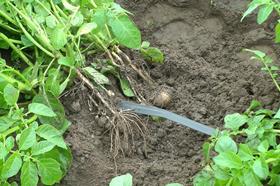
Farmer-led research has shown the benefits of planting cover crops in absorbing excess nitrogen to help boost soil health.
Backed by Innovate UK, with the support of researchers at NIAB and Cranfield University, six farmers tested their soil health with cover crops, sown after applying anaerobic digestate (AD).
Farmers took soil samples after separating their land into four different treatment areas – AD with cover crops, AD only, cover crops only, and a control section of neither.
The soil samples were analysed at different depths across the four treatments in order to see how nitrogen levels are affected by the application of digestate and/or cover crops.
Where nitrogen sinks to the lower levels of soil it potentially becomes unavailable to the next crop, and the risk of nitrate leaching into ground water increases.
Results found that often when cover crops were grown on soil after the AD was applied, the available nitrogen was significantly reduced in all levels of the soil, and more than halved in the lower levels, indicating that the cover crops had absorbed the excess nitrogen.
Dr Lydia Smith, Head of NIAB Innovation Farm and the Eastern Agri-Tech Innovation Hub, said:“The early results were very exciting – often the cover crops were doing exactly what we wanted in taking up that excess nitrogen from the soil. Going forward we’re keen to look more closely at the nitrogen availability and at worm counts, and to get the VESS training up to scratch so farmers can help in working out how and when is best to carry out these assessments.”
Helen Aldis, Innovative Farmers Development Manager, said: “Farmer-led research is critical to solving challenges in every day farming. It is encouraging that the farmers are continuing this field lab and getting help with training to get the best out of the trial. We’re really looking forward to seeing more results from the next phase of the research and finding out what the implications are for soil health.”
The research suggests cover crops can potentially improve soil health by increasing the effectiveness of digestate applications, reducing the risk of leaching, as well as making more nitrogen available for the farmer’s next crop.
As more trials are needed to test this theory Innovative Farmers and Agri-Tech East are launching a follow-on field lab this autumn with sponsorship from AHDB. The second phase will continue to investigate how best to stabilise nitrogen so that it is not released as GHG or leaches into water, but there is also interest from the farmers to explore how digestate affects soil bacteria.



